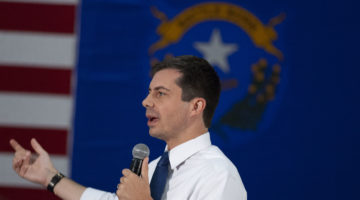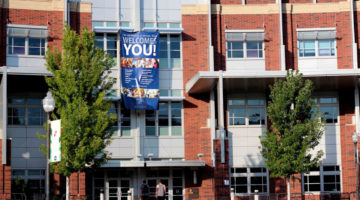
Breanna Denney/Nevada Sagebrush
Students line up outside the Nazir Ansari Business Building before the Democratic caucus on Saturday, Feb. 20. Despite efforts by the Democratic Party and its candidates, turnout for the caucus was 33 percent lower than it was in 2008.
By Jacob Solis
Former Secretary of State Hillary Clinton won her second nomination contest this year with a solid victory in Saturday’s Democratic caucus, the first official vote on any of the presidential candidates from Nevada voters. Clinton received 52.6 percent of the vote and netted 19 of Nevada’s 35 available pledged delegates. Not too far behind was Vermont Sen. Bernie Sanders, who pulled in 47.3 percent of the vote and 15 delegates.
In the weeks and months leading up to the event, polling was sparse and gave little insight into what Nevada would actually do in the caucus. While Clinton led by double digits only one month ago, the only poll released within two weeks of the caucus showed Clinton and Sanders in a virtual tie. This, coupled with internal polling that likely showed similar data, prompted Clinton’s campaign to heavily downplay expectations in a state that had previously been a surefire win.
Even so, Clinton’s spirits weren’t dampened as she gave her first true victory speech of the year.
“You know, I am so, so thrilled and so grateful to all of my supporters out there,” Clinton said. “Some may have doubted us, but we never doubted each other.”
In the Sanders camp, staffers were hoping for a large turnout to help boost the self-proclaimed democratic socialist to victory. That turnout never really materialized, as only an estimated 80,000 people turned up to caucus, according to state party officials. It’s a drop of 33 percent from the last Democratic caucus in 2008 and represents only 17 percent of the half-million registered, active Democrats in the state.
On an appearance on NBC’s “Meet the Press” last Sunday, Sanders directly attributed the loss to low turnout.
“The voter turnout was not as high as I had wanted,” Sanders said. “And what I’ve said over and over again, we will do well when young people, when working-class people come out. We do not do well when the voter turnout is not large. We did not do as good a job as I had wanted to bring out a large turnout.”
Now the Democrats will turn their attention to Saturday’s primary in South Carolina, where Clinton is projected to win big off the strength of her support among that state’s African-American voters, and to next week’s Super Tuesday, where voters in 14 states and American Samoa will all head to the polls.

Marcus Lavergne/Nevada Sagebrush
Caucusgoers sit and talk in a room in Schulich Lecture Hall on Saturday, Feb. 20. Supporters hold signs and wear shirts and pins projecting their endorsement of Democratic presidential hopefuls Hillary Clinton and Bernie Sanders.
While the Democratic race may be over in the Silver State, the Republican race is heating up, and it’s heating up fast.
Hot off a massive victory in Saturday’s South Carolina primary, real estate mogul and surprise front-runner Donald Trump has firmly established his lead over every other Republican candidate. Because South Carolina is a winner-take-all state, Trump took home all 50 of the state’s delegates. It’s put Trump 56 delegates ahead of the next closest contender, Texas Sen. Ted Cruz.
The victory was so sound that it put the final nail in the coffin for former Florida Gov. Jeb Bush, who officially suspended his campaign after a fourth-place finish in the Palmetto State. Bush’s exit has officially whittled the race for the Republican nomination down to five contenders and only two of those contenders — Rubio and Ohio Gov. John Kasich — are standard “establishment” candidates.
Cruz, Trump and to a lesser extent retired neurosurgeon Ben Carson have all managed to stay in the race on the strength of their self-proclaimed “outsider” credentials. Trump and Cruz especially have been buoyed by a core of conservative voters who are more than a little upset with the Republican establishment, and who are calling for an immediate sea change.
In Nevada, it’s become clear that the caucus is Trump’s to lose. Both the latest Gravis poll and the latest CNN/ORC poll have Trump with a double-digit lead on Cruz and Florida Sen. Marco Rubio. While victory for either of the two senators left in the race is not outside the realm of possibility, it is looking less and less likely as the caucus draws closer.
Nevada’s Republican caucus differs from its Democratic counterpart largely due to the fact that Republican voters use a secret ballot system. In addition, Republican caucusgoers had to be registered to vote 10 days in advance, largely negating the possible sway of first-time voters. This removes the possible swaying of undecided voters that happens in the Democratic caucus, and makes it less likely that results will deviate too far from the polls.
To close the gap, these last five candidates have all been making their rounds in the state in a last-minute effort to close the gap between themselves and Trump.
Republican voters officially head to the polls at 5 p.m. on Tuesday.
Jacob Solis can be reached at jsolis@sagebrush.unr.edu and on Twitter @TheSagebrush.











